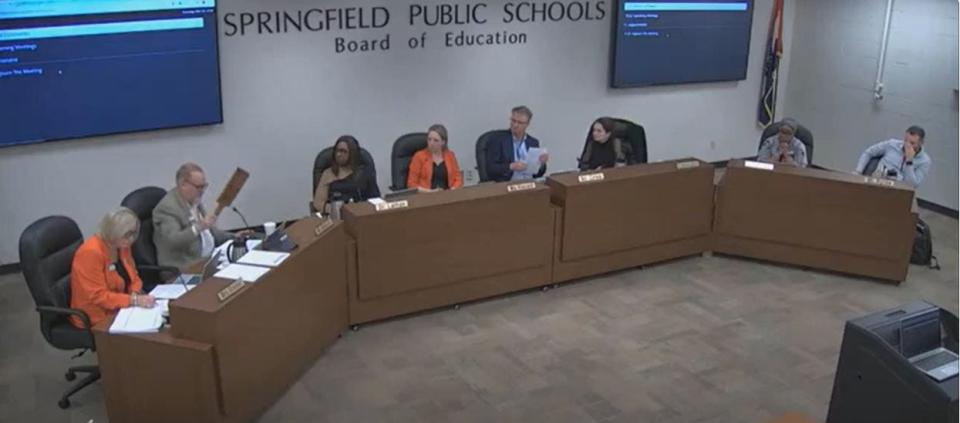Holding paddle, SPS board member urges return to corporal punishment for students

- Oops!Something went wrong.Please try again later.
Holding a wooden paddle, Springfield school board member Steve Makoski urged a return to corporal punishment.
"I would encourage board members to begin a dialogue — I brought a prop with me here — and that dialogue would be corporal punishment," he said. "I think it's something that we should talk about. I believe it could be used as one of our tools as part of discipline guidelines."
Speaking during the board comment section at the end of a 4-1/2-hour meeting, Makoski outlined a series of steps he believed the district could take to address student behavior issues.
He said the Missouri School Boards' Association, which advises districts on policy adoptions and revisions, ought to create a policy on corporal punishment that is not "cookie cutter" or "one-sided." He announced plans Tuesday to write MSBA with that request.

"If a school district is to actually pursue a corporal punishment policy then MSBA ought to come up with some guidance on that rather than just stating in a policy that there is no corporal punishment," he said. "There are a lot of districts in the state that use it and I think that we ought to take that under consideration as a board."
The comment period at the end of meetings is reserved for board members to make suggestions or statements on any topic. Typically, Superintendent Grenita Lathan and her leadership team just listen.
The Springfield district currently outlaws corporal punishment. Adopted in 2015 and revised in 2022, board policy JGA-2 reads, in part: "No person employed by or volunteering on behalf of the district shall administer corporal punishment or cause corporal punishment to be administered upon a student attending district schools."

Board member Judy Brunner, a former Springfield teacher and principal, was the only one to respond to Makoski's suggestion.
"As far as corporal punishment is concerned, I served many years as a principal and I thank the good Lord no one ever expected me to hit a child and that is just the truth. I could not have done it," she said. "I paddled my own at home. I could not have done it in a school setting, I could not."
Speaking to Lathan, Makoski said support for good behavior ought to start with parents.
"Dr. Lathan and your employees, they're faced with no choice but to deal with the behavioral issues because students I think in general lack discipline from the homefront and ... I don't want to say this in a broad brush that all the parents are like that," he said. "Parents mean well but sometimes I think we're just a babysitting service."
In 1977, the U.S. Supreme Court ruled school corporal punishment was constitutional, leaving the decision to permit it up to each state.
Missouri is one of the 19 states, mostly in the South, where corporal punishment is still allowed. Adjacent states that allow it include Arkansas, Kansas, Kentucky, Tennessee, and Oklahoma.
Others include Alabama, Arizona, Colorado, Florida, Georgia, Idaho, Indiana, Louisiana, Mississippi, North Carolina, South Carolina, Texas and Wyoming.
The American Academy of Child & Adolescent Psychiatry said in a 2012 statement that corporal punishment may have a high rate of immediate behavior modification but is associated, over time, with inappropriate behavior including:
Increased risk for physical abuse;
Learning that aggression is an acceptable method of problem-solving;
Experiencing physical and emotional pain, which decreases learning capacity;
Being less likely to learn why a certain behavior or action was wrong; and
Behaving out of fear in the future.
A "zero tolerance" for smartphones
In addition to corporal punishment, Makoski urged other steps. He called for "zero tolerance" for smartphones in the classroom, the immediate removal of disruptive students, and a series of "stand down" assemblies to spell out behavior expectations for students.
"I would be an advocate for a districtwide safety and discipline 'stand down' to address students and staff together of the need to be respectful, considerate," he said, adding, "Violence and assault will not be tolerated."
He added: "Violators will be dealt with swiftly and appropriately and this 'stand down' should be conducted in an assembly format."
More: Missouri school district reinstates spanking as punishment: 'We've had people actually thank us'
Brunner said based in her experience in schools, large-scale assemblies are not the best format to communicate the information.
"That would probably be one of the least effective ways to really spread the message," she said. "I am not saying the message is not worthy to be spread, but a schoolwide assembly? There is just a lot that goes on trying to hold the attention of a large group."

Board member Shurita Thomas-Tate questioned how effective the board can be at encouraging others to engage in respectful behavior.
"With regards to discipline, it's hard for ... me to really take seriously sometimes some of the comments that I hear regarding student discipline and zero tolerance when we as a board have not even demonstrated civility and kindness and respect for one another," Thomas-Tate said. "We expect our children to do that and yet at this very board we don't demonstrate that on a regular basis."
One of the steps Makoski suggested that appeared to gain traction was a significant restriction of smartphone use in the classroom. He used the term "zero tolerance."
Brunner said she agreed that "cellphones are one issue, I am not going to say they are not" but stopped short of calling for them to be restricted or banned.
Board members Maryam Mohammadkhani and Kelly Byrne said they are supportive of restricting the distraction.
"My stance would be from bell to bell, they should not be seen and if they are, there should be consequences," Byrne said. "I don't think it's our job to police them in terms of locking them up or putting them in bags or whatever."
Byrne noted there has been a push under Lathan's leadership to curb use. "We have some schools that are doing it successfully in the district. And the feedback that I hear from that is positive."

Mohammadkhani said when the topic of restricting cellphone use in schools comes up, parents often say they want their children to have them in case of an emergency. She disagreed with that rationale, arguing that if "something truly horrific" happens, student access to smartphones could create more chaos.
"You want one person telling the students where to go, duck down, exit through the window," she said, noting that by phone, the directions can become diluted by "parents and friends and cousins."
"We need to have one commander and that is the teacher in the classroom," she said.
This article originally appeared on Springfield News-Leader: Springfield school board member urges return to corporal punishment

